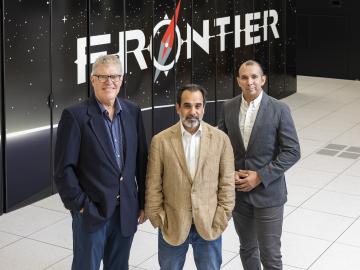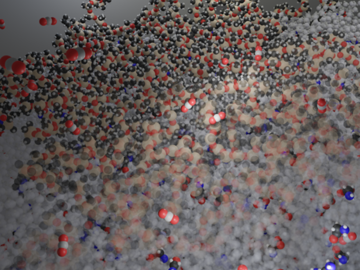
Filter News
Area of Research
- Advanced Manufacturing (4)
- Biology and Environment (24)
- Building Technologies (1)
- Computational Biology (1)
- Computational Engineering (3)
- Computer Science (13)
- Electricity and Smart Grid (1)
- Energy Science (65)
- Fusion and Fission (13)
- Fusion Energy (9)
- Isotope Development and Production (1)
- Isotopes (4)
- Materials (42)
- Materials for Computing (7)
- Mathematics (1)
- National Security (18)
- Neutron Science (18)
- Nuclear Science and Technology (10)
- Quantum information Science (4)
- Sensors and Controls (2)
- Supercomputing (59)
- Transportation Systems (1)
News Type
News Topics
- (-) Artificial Intelligence (51)
- (-) Biomedical (28)
- (-) Chemical Sciences (48)
- (-) Computer Science (105)
- (-) Fusion (26)
- (-) Grid (38)
- (-) Security (13)
- (-) Space Exploration (13)
- 3-D Printing/Advanced Manufacturing (82)
- Advanced Reactors (25)
- Big Data (25)
- Bioenergy (42)
- Biology (47)
- Biotechnology (14)
- Buildings (36)
- Clean Water (16)
- Composites (23)
- Coronavirus (28)
- Critical Materials (23)
- Cybersecurity (20)
- Education (3)
- Element Discovery (1)
- Emergency (1)
- Energy Storage (75)
- Environment (86)
- Exascale Computing (14)
- Fossil Energy (2)
- Frontier (17)
- High-Performance Computing (44)
- Hydropower (6)
- Irradiation (2)
- Isotopes (25)
- ITER (5)
- Machine Learning (27)
- Materials (96)
- Materials Science (90)
- Mathematics (3)
- Mercury (5)
- Microelectronics (1)
- Microscopy (28)
- Molten Salt (8)
- Nanotechnology (41)
- National Security (21)
- Neutron Science (81)
- Nuclear Energy (47)
- Partnerships (33)
- Physics (30)
- Polymers (23)
- Quantum Computing (18)
- Quantum Science (43)
- Simulation (19)
- Statistics (2)
- Summit (30)
- Transportation (62)
Media Contacts

ORNL is the lead partner on five research collaborations with private fusion companies in the 2024 cohort of the Innovation Network for FUSion Energy, or INFUSE, program. These collaborative projects are intended to resolve technical hurdles and develop enabling technologies to accelerate fusion energy research in the private sector.

Researchers for the first time documented the specific chemistry dynamics and structure of high-temperature liquid uranium trichloride salt, a potential nuclear fuel source for next-generation reactors.

A digital construction platform in development at Oak Ridge National Laboratory is boosting the retrofitting of building envelopes and giving builders the tools to automate the process from design to installation with the assistance of a cable-driven robotic crane.

DOE commissioned a neutron imaging instrument, VENUS, at the Spallation Neutron Source in July. VENUS instrument scientists will use AI to deliver 3D models to researchers in half the time it typically takes.

A study by more than a dozen scientists at the Department of Energy’s Oak Ridge National Laboratory examines potential strategies to integrate quantum computing with the world’s most powerful supercomputing systems in the pursuit of science.

To speed the arrival of the next-generation solid-state batteries that will power electric vehicles and other technologies, scientists led by ORNL advanced the development of flexible, durable sheets of electrolytes. They used a polymer to create a strong yet springy thin film that binds electrolytic particles and at least doubles energy storage.

John joined the MPEX project in 2019 and has served as project manager for several organizations within ORNL.

Researchers at ORNL have demonstrated that small molecular tweaks to surfaces can improve absorption technology for direct air capture of carbon dioxide. The team added a charged polymer layer to an amino acid solution, and then, through spectroscopy and simulation, found that the charged layer can hold amino acids at its surface.

Seven entrepreneurs comprise the next cohort of Innovation Crossroads, a DOE Lab-Embedded Entrepreneurship Program node based at ORNL. The program provides energy-related startup founders from across the nation with access to ORNL’s unique scientific resources and capabilities, as well as connect them with experts, mentors and networks to accelerate their efforts to take their world-changing ideas to the marketplace.

Prasanna Balaprakash, director of AI programs at the Department of Energy’s Oak Ridge National Laboratory, has been appointed to Tennessee’s Artificial Intelligence Advisory Council.


